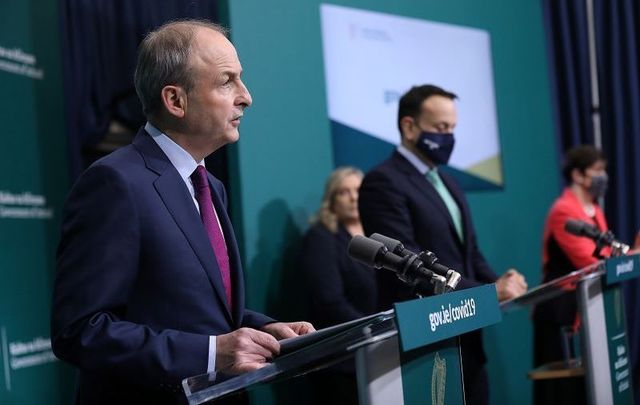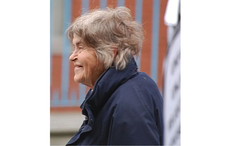The Irish government has today, January 6, announced additional public health restrictions that are coming into effect across the Republic of Ireland amid a spike in cases and hospitalizations.
In a statement on Wednesday, the Irish government said: “The Government has today agreed that additional public health restrictions will apply under Level 5 of the Plan for Living with COVID.
“Noting the advice from NPHET that the current situation with the virus has deteriorated to the point where there is an absolute need to reduce the level of mobility and congregation in order to reduce all opportunities for transmission, people continue to be urged to stay at home except for absolutely essential reasons.”
Irish government leaders discussed the new additional public health restrictions in a press briefing today, January 6:
Watch: Government briefing on latest Covid-19 restrictions | Follow live updates: https://t.co/MO56HKlpOK https://t.co/cZLGwa2poy
— RTÉ News (@rtenews) January 6, 2021
The additional public health restrictions come just over a week after the Republic of Ireland entered "full-scale Level 5 measures" on December 30.
Here are the new additional public health restrictions coming into effect in the Republic of Ireland:
- Schools: Closed until 1 Feb with some specific exceptions for final year Leaving Cert students, special education, and specialised settings.
- Early Childhood Care and Education (ECCE): The resumption of the ECCE programme is delayed until 1 Feb.
- Childcare: Closed with exceptions for vulnerable children and children of essential workers.
- Construction: Construction will close from 6 pm on Friday 8 Jan, with limited exceptions.
- Retail: Essential retail only. Click and collect from non-essential retail outlets will no longer be permitted after existing orders are fulfilled. Click and deliver will continue.
- Travel into Ireland: No travelers from Great Britain or South Africa until 9 Jan. All travelers from those locations after that date must have a negative PCR COVID-19 test result (COVID-19 not detected) within 72 hours prior to arrival.
Here are the complete restrictions that have been imposed across the Republic of Ireland:
The Irish government says: "At Level 5, the public health risk means that you will be asked to stay at home, except for travel for work, education or other essential purposes, or to take exercise within 5km of home. There will be no gatherings other than small numbers at funerals and weddings."
Schools and higher and adult education
- Schools remain closed until 1 February, except for the provision of special education (special schools and special classes) and specialised settings (such as Oberstown and high support special care schools and youth encounter projects) which will continue fully open from 11 January.
- All final year Leaving Certificate students, including Leaving Cert Applied, Leaving Cert Vocational Programme, and the traditional Leaving Cert, can attend school for 3 days a week commencing from the week beginning 11 January.
- Youth reach services will resume as scheduled.
- The resumption of the Early Childhood Care and Education (ECCE) programme is delayed until 1 February.
- Higher, further and adult education should remain primarily online.
Childcare
- Childcare services, including regulated childminders, will remain closed with the exception of services for vulnerable children and children of essential workers.
- Other existing childcare arrangements can continue to operate for vulnerable children and children of essential workers only.
- In addition, a household of an essential worker, without an existing childcare arrangement, can form a bubble with another household for the purpose of providing childcare.
Construction
- Construction will close from 6 pm on Friday 8 January, with limited exceptions including:
- Essential health and related projects including those relevant to preventing, limiting, minimising, or slowing the spread of COVID-19
- Social housing projects, including voids, designated as essential sites by Local Authorities based on set criteria
- Housing adaptation grants where the homeowner is agreeable to adaptions being undertaken in their home
- Repair, maintenance and construction of critical transport and utility infrastructure
- Education facilities sites designated as essential by Department of Education
- Supply and delivery of essential or emergency maintenance and repair services to businesses and places of residence (including electrical, gas, plumbing, glazing and roofing services) on an emergency call-out basis
- Certain large construction projects in the exporting / FDI sector based on set criteria
Retail and services (for example: hairdressers, beauticians, barbers)
- Face coverings must be worn.
- All retail, other than essential retail, is closed.
- All non-essential services remain closed.
- Click and collect:
- Click and collect from non-essential retail outlets should no longer be permitted with immediate effect.
- Existing orders may be collected.
- Click and deliver will continue to be permitted.
Social and family gatherings
- In your home or garden: No visitors are permitted in private homes or gardens except for essential family reasons such as providing care to children, elderly or vulnerable people, or as part of a support bubble.
- Other settings outside your home or garden: No social or family gatherings should take place in other settings.
Weddings
- Up to 6 guests are permitted.
Organised indoor gatherings
- These are controlled environments with a named event organiser, owner or manager.
- For example: business, training events, conferences, events in theatres and cinemas or other arts events (excluding sport).
- No organised indoor gatherings should take place.
Organised outdoor gatherings
- These are controlled environments with a named event organiser, owner or manager. For example: outdoor arts events, training events.
- No organised outdoor gatherings should take place.
Exercise and sporting events
Training
- People may meet with people from one other household in outdoor settings when taking exercise.
- No indoor or outdoor exercise group activities, including those involving children, should take place.
- Outdoor golf and tennis are not permitted.
- Individual training only. No exercise or dance classes. No indoor or outdoor gatherings involving “individual training” except for professional and elite sports.
Matches and events
- Professional, elite sports, horse racing, greyhound racing and approved equestrian events only are permitted to continue behind closed doors.
- No other matches or events are to take place.
Gyms, leisure centres and swimming pools
- Gyms, leisure centres and swimming pools must close from close of business on 31 December.
Religious services
- Services will be held online.
- Places of worship remain open for private prayer.
Funerals
- Up to 10 mourners can attend.
Museums, galleries, and other cultural attractions
- All venues closed.
- Online services available.
Bars, cafes and restaurants (including hotel restaurants and bars)
- Take away food and delivery only.
Wet pubs
- Closed.
Nightclubs, discos, casinos
- Nightclubs, discos, and casinos will remain closed.
Hotels and accommodation
- Open only for essential non-social and non-tourist purposes.
Work
- Work from home unless essential for work, which is an essential health, social care, or other essential service and cannot be done from home.
Travel restrictions
Domestic:
- People will be required to stay at home except for travel for work, education, or other essential purposes, and will be permitted to take exercise within 5 km of home.
- You can travel outside 5 kilometres of home for the following reasons:
- travel to and from work, where work involves providing an essential service
- to attend medical appointments and collect medicines and other health products
- travel to attend disability day services
- travel to attend a court
- for vital family reasons, such as providing care to children, elderly or vulnerable people, and in particular for those who live alone, but excluding social family visits
- for food shopping
- for farming purposes (food production or care of animals)
- to attend a wedding or funeral
- to visit a grave
International:
- The current travel moratorium in place for travel from Great Britain and South Africa is extended until midnight Friday 8 January 2021.
- From 9 January 2021, all passengers arriving at Irish airports and ports whose journey originates in Great Britain or South Africa will be requested to have evidence of a negative result from a PCR COVID-19 test (COVID-19 not detected) taken up to 72 hours prior to arrival in Ireland.
- Essential supply chain workers will be exempt from the requirement to have evidence of a negative PCR COVID-19 test result. An exemption from the requirement to have evidence of a negative test result can also be considered in exceptional and urgent humanitarian cases, particularly related to an emergency medical need for the person or his/her child.
- There will also be an exemption for the Garda Síochána in the exercise of their functions and officials carrying out public service duties.
Outdoor playgrounds, play areas, and parks
- Open with protective measures in place.
Transport
- Face coverings must be worn.
- Walk or cycle where possible.
- Avoid public transport - essential workers and essential purposes only.
- Public transport capacity will be restricted to 25%.
Over 70 and medically vulnerable individuals
- Those aged over 70 years and over and the medically vulnerable should exercise judgement regarding the extent to which they engage with others and in activities outside home. Specific guidance will be provided.
Visiting long-term residential care facilities (nursing and care homes)
- Suspended, aside from critical and compassionate circumstances.




Comments